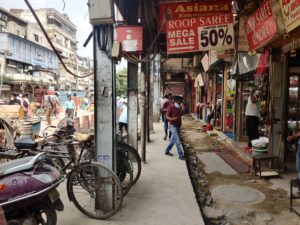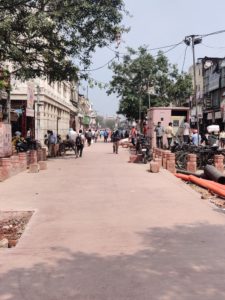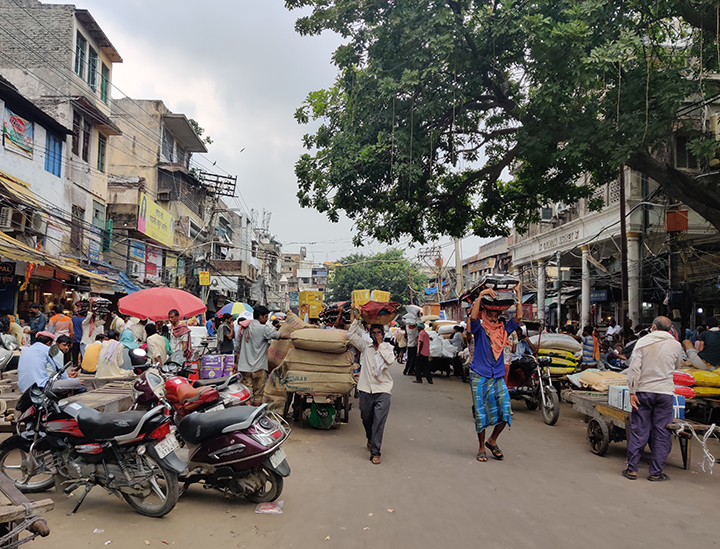When two brothers running a jewellery showroom committed suicide due to inability to repay debt taken from private financiers, Patriot puts the whole modus operandi of loan sharks under the scanner and finds a dismal scenario
Shopkeepers look around furtively to see if anyone else heard Patriot’s query about loan sharks. When they feel assured on this account, they admit that Chandni Chowk has had a history of “financiers” and the “bouncers” who work for them, pressurising the debtor and even resorting to physical abuse to get their boss’ money back.
These things keep happening, we are told, when we visit Old Delhi’s markets. The difference this time — and why we set out to understand this business — was that harassment for repayment of a loan drove two brothers to suicide. Their store, Shri Krishna jewellers, falls in the central refurbished road of Chandni Chowk, and is now closed.
The brothers, aged 47 and 42, allegedly hung themselves in their shop’s third floor on July 26, leaving behind a suicide note in which they blamed their poor financial condition for the step. Later, however, family members alleged that the brothers had borrowed money from a private financier and were unable to repay it because of the Covid-19 pandemic forcing a lockdown and thus major losses to their business. The two, according to the family, were harassed and also thrashed by bouncers sent by the financier.
Sanjay Bhargava, President of Sarv Vyapar Mandal of Chandni Chowk, says many people take such loans, “Apart from taking money from banks, people take from private lenders. That has been happening for a long time.” But with post lockdown sales unable to recover, the ground reality is that earnings are still next to nothing for traders. So Bhargava says a lot more people are going to face problems.
“Aamdani atthanni, kharcha rupaiya, kabhi toh khatum hoga na?” meaning people who live beyond their means will one day run out of money. About the brothers, he says, “This has been happening for many years, they (the brothers) have been in default earlier as well.”

In fact, reports say the two brothers had allegedly borrowed around Rs 60 lakh on interest from private financiers. As they were unable to return the money or pay the interest, the financers used to send their “bouncers” to the showroom to collect the money.
Usually private financiers lend money on a high interest rate. An employee of the showroom told mediapersons that many moneylenders used to come to the showroom and ‘torture’ the two brothers. They would also allegedly ask them to consume poison if they did not have money to pay.
A week since the incident, a case is yet to be filed. An official with DCP (North) told us that as the suicide note did not name any person, the FIR has not yet been lodged. He said that while the family of the men made the allegations, an investigation is underway to see just how these people mentioned were involved. Once anything is found, the police will be going ahead with filing a case, he claimed.
While many of the jewellery shops lined in the same lane next to the shop where the brothers took their lives remain closed, the ones which were open refused to speak with this reporter. The victim’s father, Adishwar was quoted as saying that his sons were being harassed by a man and his associates who also own a jewellery store.
Although the shop owners in this lane refused to speak to us, we did meet some shop employees from the stores around, who were trying to woo customers. They said there are many financiers, some who own their own shops, and others whose entire business is run on this model. Their bouncers make good money: one of the more vocal persons from the group said, “Some even get paid Rs 50,000 per month. And they have many working for them. They come and thrash people to get their money. We had heard that the brothers had also been beaten,” he said, with the others agreeing.
The men also pointed out that in the market people would not speak about these financiers, or their bouncers, as no one wants to mess with them. This was a sentiment shared by a shop owner dealing in wholesale and retail of wedding wear. Girish told us the people who give these loans are powerful. “Because of their power, these brothers must have done what they did.” And he believes that with people earning next to nothing since March, there will be many like the brothers who will be unable to repay their loans.
Lockdown affects still ongoing
When one enters Sadar Bazar, the fact that things are now on the move since the lockdown was lifted, is very apparent. Shop workers load carts and vans, others unload goods, rickshaws and people with heavy weight on their shoulders jostle for space on the tiny crowded road. And this continues on till Chandni Chowk. But despite what the streets may tell you, the market is receiving half of the footfall it did before the pandemic and the lockdown which was imposed since March 25.
The market finally opened two months later in June, but many traders kept their shutters down for a few more weeks, and the hard times are continuing. As we enter Nai Sarak of Chandni Chowk, one of the first few shops is that of Rakesh selling women’s wear. His shop is bereft of customers, the loud fan in his shop the only activity inside. Rakesh tells us, “Nothing at all” when we ask him about his business. He later says he has made next to nothing from a shop which was opened in 1901 by his family.
Patriot also meets two brothers who sit in their almost bare shop. For them as well, things haven’t been great. The siblings say senior citizens are avoiding coming to the shops, but they — 62-year-old Harmohan Pal Singh and 76-year-old Mahinder Singh – two of four brothers, one of whom has lived to 91 – say “It’s a matter of our stomach, we have to come”.

The brothers, who have had this shop since 1947, the year India got independence, say trade is so low that they have nothing but their savings to live on. What worries them is the fact that they keep hearing in the news that cases of Covid-19 positive people are increasing, making the coming weeks all the more uncertain.
On September 2, the Capital recorded 2,312 new Covid-19 positive cases, its highest single-day jump in nearly two months. And while things are definitely worse off for traders than during the lockdown, closing shop means losing everything.
Bhargava points out that 70% of the shops are open in Chandni Chowk, but the footfall still leaves a lot to be desired. “The saree section is one which is maybe doing better but for others it has picked up only about 30% of sales from earlier. Things are not very good. Footfall is almost about 40-50% of the earlier one.”
He points out that no help has been offered to the traders. “Two weeks back (August 23) traders had a Zoom meeting with (Delhi) CM Arvind Kejriwal. One of the things I requested was to better the infrastructure, as only then can we look at more customer footfall, especially safe distancing which has not been followed. I also requested that the GST assessment should be stopped and people should get more time to fill in their forms. I also requested that fixed charges in the electricity bill during lockdown time should be dispensed with.”
Another shop owner Manish, who opened his store in July after the pandemic, points to Bhargava’s point of infrastructure problems in Chandni Chowk. With things already at an all-time low, he says fear of the virus along with the street being blocked due to construction, means customers are giving this old market a miss. His father, who lays on a mat, taking a nap on the floor inside the small shop selling Chikankari, is the only other person working in the shop. With no earnings and next to no sales, they are unable to afford staff, nor are they required as most days they see just about a couple of customers.
“We are just sitting idle; we aren’t even hitting a margin. Everyone (traders) is worried and not making enough…There are a lot of cases (of people taking loans from financers) in Chandni Chowk, and the current position is so low that people will not be able to pay those loans back.”
General Secretary in the Federation of Sadar Bazar Traders Rakesh Kumar Yadav says with everyone going through a tough time, they have told traders to go easy on those they may have given a loan to. “We are of the same family. If someone owes you money, don’t harass them so much that they go into depression. Then your money will go and also allegations will fall on you…We have told them insaniyat ki baat bhi rakhiye (Be humane)”.
They have already taken the crisis into account, and after seeing the case from Chandni Chowk, do not wish for the same fate to befall anyone here. “Do you think it’s easy to do such a thing? They must have seen no other way…more than 50% (of traders) are in this position of debt, and are unable to repay because of the present circumstances.”
“I know many people (who have taken loans) but they will not want to put their izzat (honour) out in the open. It becomes a matter of prestige. Those people who give loans, will say give me jewellery, give me your car. They will call the person several times, disturbing the entire family”.
But the problem, Yadav says, is also that many traders have to resort to private financiers because loans from banks usually do not get sanctioned.
Help from the government
Finance Minister Nirmala Sitharaman announced in May, the plan to rescue the ailing micro, small, and medium enterprises (MSMEs) in the country due to Covid-19 lockdown. This included collateral-free loans up to Rs 3 lakh crore backed by government guarantee, Rs. 20,000 crore subordinate debt provision for stressed MSMEs, Rs 50,000 crore equity infusion through fund of funds, global tender restrictions, repayment of dues within the next 45 days and change in definition of these businesses.
Since then, according to government data, of Rs 3 lakh crore under the Emergency Credit Line Guarantee Scheme (ECLGS), 32.8 per cent (Rs 98.665.93 crore) has been disbursed in 22,77,463 MSME loan accounts, as of August 12.
Yadav points to this provision as having provided no help to any of the traders he knows. “Tell me one person who has got a loan from a bank or something from the government,” is his challenge.
The scheme was tweaked after the May announcement to cover those companies with bigger turnovers. Enterprises with a turnover up to Rs 250 crore with outstanding loans up to Rs 50 crore were added to the scheme, while the earlier limit was Rs 100 crore and Rs 25 crore respectively.

Significantly, credit information company TransUnion Cibil, in its recent report says that getting a personal loan from banks in the post-Covid era is going to be difficult as banks tighten credit policy and customer selection norms.
Reports say the company used the 2008-09 financial crisis as a benchmark to predict a fall in the approval rates for all retail lending product categories.
According to the report, default rates will move up the most in personal loans and credit cards, while home loans and auto loans will see less of a shift. This will result in lenders being more selective in the latter two categories. Extrapolating from the 2008-09 crisis, TU Cibil said the drop in approval rates then was most acute for personal loans (-30%) and loans against property (-28%).
Traders who are facing a tough time in the post-lockdown phase may see no respite anytime soon. As things get tougher for them, acquiring loans gets harder. Those who are stuck with the inability to pay off their debt taken from a private financier are now in the uncomfortable position of being hounded for the payback.
(Cover: The road leading to Chadni Chowk may look like business is back to usual, but in fact the trade is down to half // PHOTOS: Sashikala VP)





